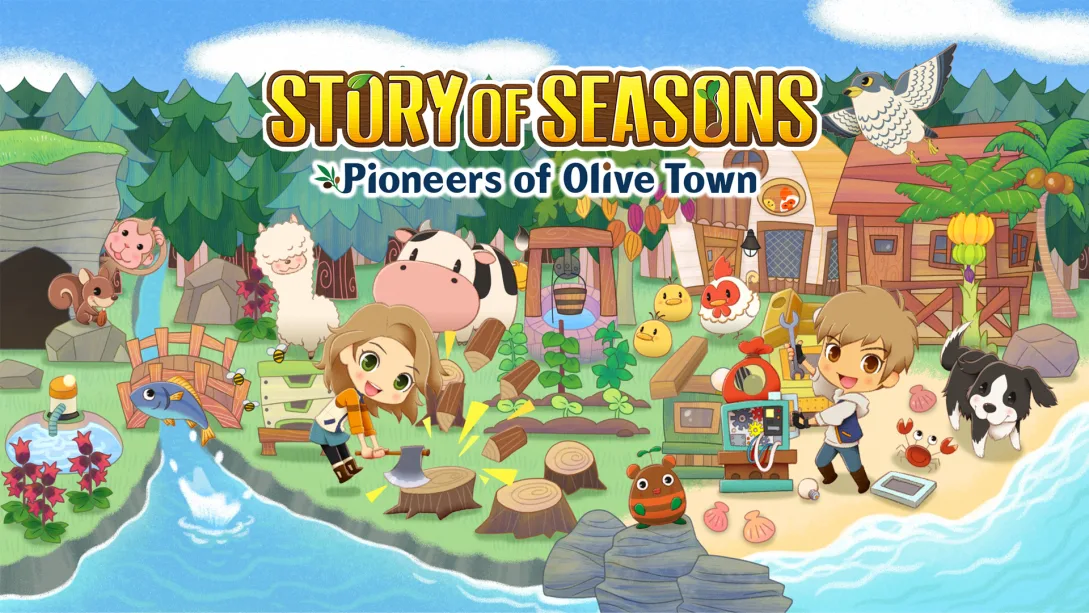Story of Seasons: Pioneers of Olive Town
The ‘Harvest Moon’ Farm Is Open For Business In Story of Seasons
The history of the Story of Seasons games dates as far back as 1997, which also means that Story of Seasons: Pioneers of Olive Town grants the series its coveted quarter-century 25th-anniversary benchmark that few games ever reach. What, exactly is Story of Seasons? That’s the question that still exists in most gamers’ heads from both veterans and newcomers alike. The answer to that question may be a familiar one to the former, as Story of Seasons is the Harvest Moon franchise that players have grown to love since 1997 on the SNES.
A quick history lesson goes as far back as the original Harvest Moon when the series, beginning with the first game was published by Natsume. The original developers would eventually become Marvelous and would continue to develop Harvest Moon titles until 2015 in America when it became Story of Seasons. This was because Natsume, who still held the rights to the Harvest Moon trademark, cited differences with Marvelous which forced them to part ways.
Story of Seasons: To The Future Onward
Since the Japanese name for the series was always Bokujō Monogatari, this didn’t affect Japanese sales. Since Natsume held the Harvest Moon rights in America, Natsume was milking a cash cow to unknowing fans who didn’t know that the original developers had already rebranded under a different name in the West. Thus, Story of Seasons picked up where the original Harvest Moon left off, with the current Harvest Moon being a husk of its formal self.
Thinking about this circumstance, it’s not much different than Konami taking the Metal Gear trademark that Kojima created and make games for it with the intent of milking it as much as possible, despite Kojima moving on from Konami due to differences. The difference here, of course, is that the Bokujou Monogatari series is very much alive and well, just under a new name for the American side of things.
A Long Overdue Chapter In The Story of Seasons
This also makes Story of Seasons: Pioneers of Olive Town the first original title, not counting the spin-off Doraemon collaborative title, since 2017’s Trio of Towns, which coincidentally was released for the 20th anniversary of the franchise. The only other title was last year’s Friends of Mineral Town which was a remake of the GBA title released in 2003. That said, knowing the history behind the franchise and the passion behind the developer’s resilience towards preserving its 25-year legacy, I was excited to see how the series evolved over the past two decades.
The last Story of Seasons title I played was Save the Homeland which was a PS2 title in 2001, which compared to Olive Town, was fully developed in 3D complete with a rotating camera and realistic designs with a cartoon inspiration. Olive Town is more of an isometric top-down game with bright colorful graphics and heavy anime-inspired character designs, which was something of the norm at this point in Story of Seasons time.
Inherit Your Grandparent’s Farm! Again!
The story for Olive Town is the same as almost every other Story of Seasons game in the past, placing you in the role of a young farmer who moves into a small town and inherits a deceased family member’s farm. It’s the player’s task to restore the farm to its glory while befriending the townsfolk and even potentially finding romance. From the beginning, I was impressed with the character creation as it took a unique approach that very few SoS games have done in the past.
The player has full control over the character they create, which includes facial features, hair, body type, and clothing. There isn’t a set “male” or “female” option, rather there are “masc” and “femme” options. Even the voices themselves avoid categorizing into genders, using adjectives as “Wild” or “Charming” to describe the various voices available.
Story of Seasons Lets You Truly Self-Insert As The Protagonist
While the opportunity to choose your gender comes up early in a conversation with the mayor as he tries to remember who you are, the freedom of choice in terms of designing your farmer is a subtle yet welcoming one. It’s a step in the right direction towards blurring the lines of gender for sure.
After the player’s introduction to the mayor, the farm, and the town, the player is free to their own devices. They can choose to clear up the rubble, grass, trees, and overall mess surrounding the farm and procure resources that way. Players can also decide to enter the town and befriend as many residents as possible, introducing themselves to their neighbors. The game didn’t seem to have a right or wrong way to go about it as it seemed to go about the leisure of the player.
Story of Seasons Probably Won’t Win Many New Fans
Players could offset any materials they find and load them off to sell for the next day while using those same materials to repair broken structures around the farm. One of the first repaired structures is a run-down coop that is used to house chickens. The chickens can then either be bought or tamed in the wild, which eventually will increase the revenue to the farm and the city itself.
Defining the game as “fun” is subjective to whether or not players will find the farm simulating life sufficient enough to carry itself. Games such as Animal Crossing were inspired by the Story of Seasons series and much like the former, the latter doesn’t seem to have an overarching plot. The player owns a bit of land and it’s up to the player to transform the mess of land their grandpa gave them into a flourishing farm. How the player gets there is entirely up to them.
Overall, Story of Seasons: Pioneers of Olive Town will give long-time fans the pleasure of raising a farm from nothing to something, as they have been for the past 25 years. For newcomers to the series, it seems like a good starting point to become introduced to the game as well thanks to its quality of life changes. While the game and the series isn’t for everyone, it’s at least addicting enough to be played in spurts.
Story of Seasons: Pioneers of Olive Town is available on the Switch and PC.

